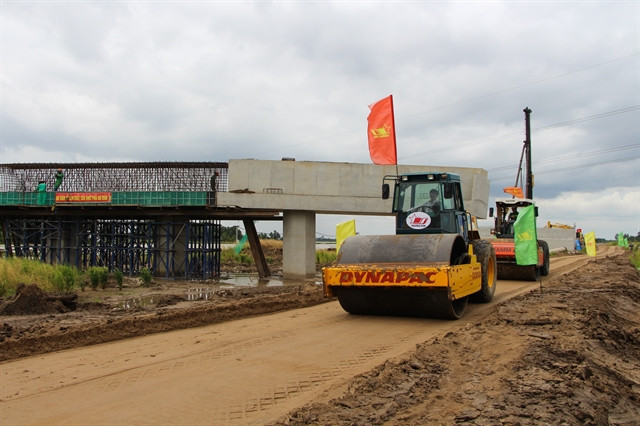 |
| Construction work is conducted on the Cần Thơ-Cà Mau Expressway. — VNA/VNS Photo Hồng Thái |
A shortage of sand needed to build highway embankments is affecting the progress of many southern highway projects, and central- and local-level authorities are working on solutions.
According to the Ministry of Transport (MoT), the Mekong Delta needs more than 65 million cu.m of sand to build roads for six key expressway projects and a number of other important ones.
However, as of June this year, many projects are lacking sand for embankment.
For instance, the Cần Thơ - Cà Mau, and Châu Đốc - Cần Thơ - Sóc Trăng expressways, and Ring Road No 3 in HCM City are lacking 9.6 million, 10.5 million and 8.6 million cu.m of sand, respectively.
In fact, the southern and southwestern expressway projects are strategically significant, needed not only to shorten travel time between provinces and cities but also to promote regional economic development.
With a modern transportation network, these areas will have easy access to major economic centres, facilitating the circulation of goods as well as tourism.
By 2030, the Mekong Delta aims to have about 1,200km of highways connecting HCM City, the east and the southwest.
The Transport Construction Investment Management Authority under the MoT said that the Đại Ngãi Bridge project on National Highway No 60 connecting Trà Vinh and Sóc Trăng provinces has basically completed its ground handover.
Work on the route is more than 32 per cent completed, which is nearly 9.7 per cent behind schedule due to lack of sand materials for the roadbed.
According to the target assigned by the Government, Tiền Giang Province needs nearly 16 million cu.m of sand for highway projects, said the MoT.
Director of the HCM City Traffic Construction Investment Project Management Board Lương Minh Phúc said that with the Government’s urgent directives, difficulties and problems in exploiting sand resources have been basically resolved.
The MoT directed investors to closely coordinate with mines to promptly complete procedures to get the needed materials.
Vĩnh Long and Đồng Tháp provinces accelerated progress and increased mine capacity to supply projects as required. Vĩnh Long Province supplied 1.4 million cu.m for HCM City Ring Road 3 and two million cu.m for the Cần Thơ - Cà Mau Expressway project.
At the same time, localities with sand resources in the Mekong Delta will coordinate with the interdisciplinary working group chaired by the Ministry of Natural Resources and Environment to review material sources, ensuring an adequate supply for projects and prioritising the ones set to be completed by the end of next year.
Director of the Mỹ Thuận Project Management Board Trần Văn Thi, the investor of two expressway component projects from Cần Thơ to Cà Mau, said that to complete the projects next year, the sand loading work must be completed by the end of this month. The projects need about 9.6 million cu.m of sand.
Since last month, contractors have called for at least 70 per cent of the sand needed to complete their projects.
Thi said that to ensure the goal of completing the project by the end of next year, the project management board has required contractors to reestablish a detailed construction plan for the remaining items to make up for delays.
In addition, the Government also asked businesses involved in sand mining to apply modern technologies to minimise negative impacts on the environment.
Deputy Prime Minister Trần Hồng Hà proposed alternative measures, such as using artificial sand and recycled sand, to reduce pressure on natural resources.
But effectively applying these measures requires careful technological preparation. — VNS